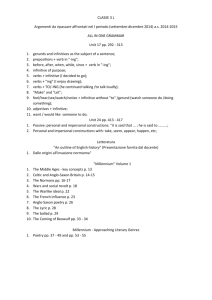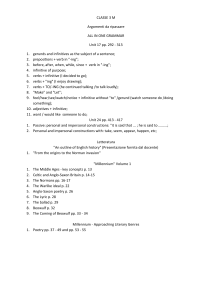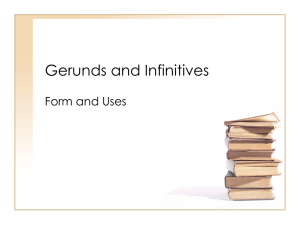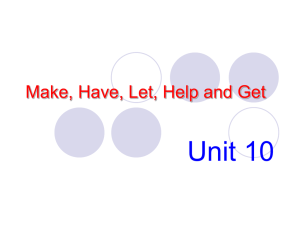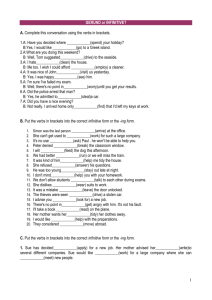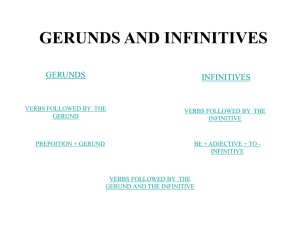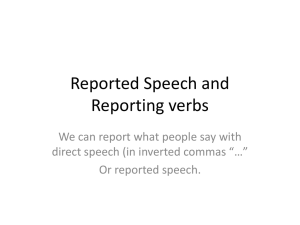VERB PATTERNS
advertisement
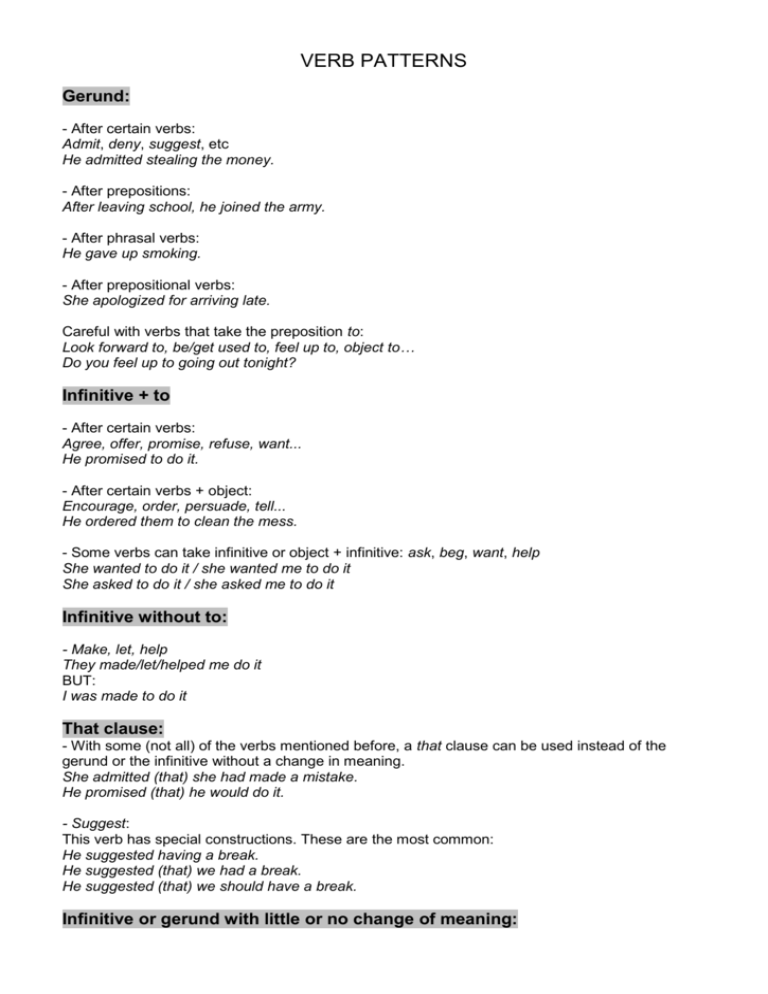
VERB PATTERNS Gerund: - After certain verbs: Admit, deny, suggest, etc He admitted stealing the money. - After prepositions: After leaving school, he joined the army. - After phrasal verbs: He gave up smoking. - After prepositional verbs: She apologized for arriving late. Careful with verbs that take the preposition to: Look forward to, be/get used to, feel up to, object to… Do you feel up to going out tonight? Infinitive + to - After certain verbs: Agree, offer, promise, refuse, want... He promised to do it. - After certain verbs + object: Encourage, order, persuade, tell... He ordered them to clean the mess. - Some verbs can take infinitive or object + infinitive: ask, beg, want, help She wanted to do it / she wanted me to do it She asked to do it / she asked me to do it Infinitive without to: - Make, let, help They made/let/helped me do it BUT: I was made to do it That clause: - With some (not all) of the verbs mentioned before, a that clause can be used instead of the gerund or the infinitive without a change in meaning. She admitted (that) she had made a mistake. He promised (that) he would do it. - Suggest: This verb has special constructions. These are the most common: He suggested having a break. He suggested (that) we had a break. He suggested (that) we should have a break. Infinitive or gerund with little or no change of meaning: - Begin, start, continue It started to rain/raining - Like, love, prefer, can’t stand... I like travelling by train / I like to travel by train - We prefer like to when you express what you think is the right thing to do: I like to pay my bills on time. - When we use would, only the infinitive is possible: I’d like to have a cup of coffee. I’d really hate to live there. Verbs with gerund or infinitive with a change of meaning: - Remember, forget and regret + infinitive: action at the same time or later: Remember to give her the message. I regret to tell you that we can’t offer you the job. + gerund: action earlier in time: I remember giving her the message. I regret telling her that. - Stop, go on + infinitive: following action He went on to say that he wanted my advice. I stopped to have a cuppa. + gerund: existing action: He went on repeating the question. I stopped working at eight. - Try + infinitive: attempt He tried to open the door, but it was jammed. + gerund: experiment It was very hot in the room and there was no air conditioning, so he tried opening the door. - Verbs of the senses: see, hear... + infinitive: completed action. I saw him cut the tree ( I saw the whole of the action) + gerund: action in progress I saw him cutting the tree(he was in the middle of it) REMEMBER ALSO: The gerund and infinitive also have passive and perfect forms: I don’t remember having said that. He doesn’t like being told what to do. I don’t want to be doing this exercise. Exercises 1 Rewrite the sentences using the verbs in brackets. 1 He said he hadn't tried to overthrow the government. (deny) He denied trying to overthrow the government. 2 She never gets into arguments with her boss. (avoid) _______________________________________________________________ 3 He doesn't smoke any more. He stopped in 1998. (give up) _______________________________________________________________ 4 Did you arrive on time despite the traffic? (manage) _______________________________________________________________ 5 The minister said he had made a mistake. (admit) _______________________________________________________________ 6 'Go on. I'm sure you 11 get the job if you apply for it.' (encourage) She____________________________________________________________ 7 'Why don't we go out for a meal?' (suggest) He__________________________________________________________ 8 Dave wishes he hadn't lost his temper, (regret) _______________________________________________________________ 9 Tm sorry I didn’t phone.' (apologize) I ______________________________________________________________ 10 Dad wouldn’t let Kate go to the music festival, (refuse) _______________________________________________________________ 11 'OK, I'll lend you £100.' (agree) She ______________________________________________________________ 12 I’ll do better, I swear!' (promise) He _______________________________________________________________ 2 Complete the sentences with the correct form of the verb in brackets. Sometimes you need a passive form. 1 I want to be kept (keep) informed of any developments. 2 Our teacher expects us___________ (use) a dictionary. 3 I hate___________(keep) waiting. 4 She's thinking of___________ (emigrate). 5 Nobody likes___________(insult). 6 She succeeded in___________ (convince) him that she was right. 7 He was threatening___________ (call) the police. 8 He begged___________(allow) to come with us. 9 I didn't dare___________(swim) out to the island. 10 He was made___________(feel) very small by his boss. 11 Are you accusing me of___________ (lie) to you? 12 I remember___________(tell off) for speaking with my mouth full when I was a child. 3 Verbs + -ing or to with a change of meaning Complete the sentences with either the infinitive or the –ing form of the verbs in brackets. 1 I used to think (think) that life ended at 30. I'm not used to thinking (think) so hard this early in the morning. 2 Jane was never a very reliable friend. If I were you, I'd try___________(forget) her. If your clothes don't seem very white after you've washed them, try___________(soak) them in a little bleach. 3 Please stop___________(make) such a terrible noise! After half an hour, we stopped___________ (make) a cup of tea. 4 I remember___________(see) her in another French film and she was really good in that. Did you remember___________(call) Tim and tell him that we can't come on Saturday? 5 I started___________(read) classical literature at the age of six. Oh, look! It's starting___________(rain). 6 He went on ________(write) his essay, even though the noise started to get louder. The lecture began very badly, but the professor went on___________(make) some interesting points. 7 I couldn't help them___________(find) what they were looking for as I was in too much of a hurry. Harry looked so funny that I couldn't help ___________(laugh). 8 Buying your own house means___________(take)responsibility for all the repairs. I'm sure she means___________(make) some big changes in this department. 9 Do you like___________(cook)? When we have a dinner party, I like___________ (cook) something really exotic that nobody's ever had before. 10 I regret___________(inform) you that you've all failed the exam. She regrets___________(buy) those shares. They’ve halved in value over the past two years. 4 Verbs of the senses Complete the sentences with either the infinitive (without to) or the –ing form of the verbs in brackets. 1 I heard my neighbours___________(turn) off their television and___________(go) to bed. 2 I woke up at two in the morning. I could hear my neighbours ___________(have) an argument. 3 When I looked through the window, I saw her___________ (read) a book. 4 When she saw me___________(come), she waved. 5 She could feel her heart___________(pound) as she neared the end of the race.

